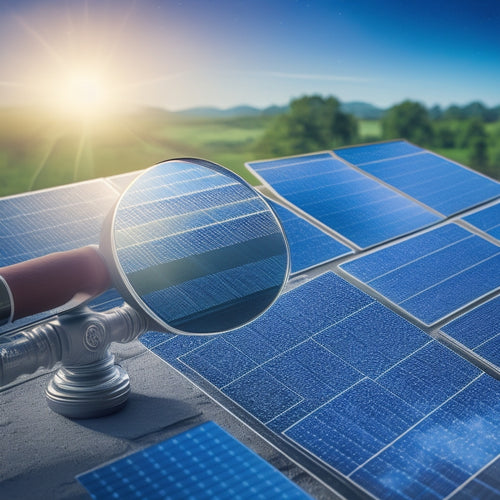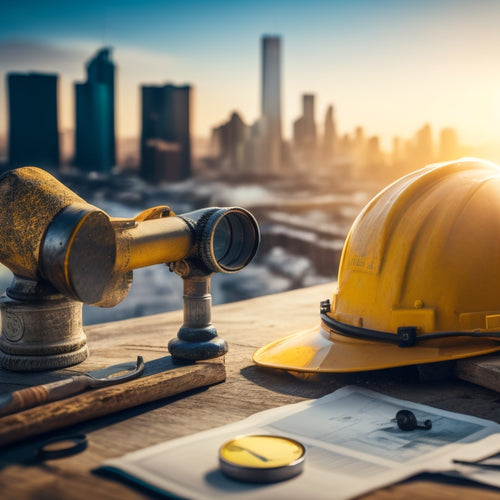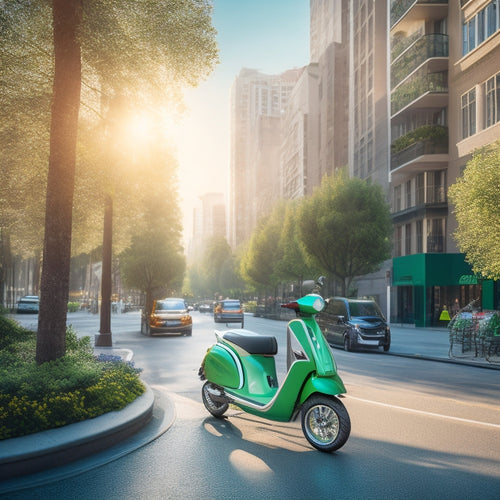
What Affects the Cost of Installing Solar Power for My Home
Share
When installing solar power for your home, several factors affect the overall cost. The system's size and complexity, panel quality and efficiency, and roof size and condition all play a considerable role. The installation company's experience and labor rates, as well as local permits and incentives, also influence the final price. Additionally, you may consider battery backup and storage, which can add to the upfront cost. All these factors can greatly impact the total investment, which is why it's crucial to comprehend each factor's role in determining the final cost of your solar power system - and there's more to investigate to get the best value for your money.
Key Takeaways
- System size and complexity, including grid connection and energy storage, impact the cost of installing solar power for your home.
- The quality, efficiency, and durability of solar panels significantly influence the upfront investment and long-term returns.
- Roof size, condition, and material type affect the number of panels needed, installation complexity, and labor requirements, adding to the overall cost.
- The experience, reputation, and certifications of the installation company, as well as local labor rates, influence the cost of installation.
- Local permits, incentives, and rebates, such as tax credits and municipal programs, can reduce the upfront cost of installing solar power for your home.
System Size and Complexity
Determining the ideal system size and complexity is crucial when evaluating the cost of installing solar power. You need to verify that your system design meets your energy needs and is suitable for your installation location. A system that's too small won't generate enough power, while one that's too large will be a waste of resources. Your energy needs will depend on factors such as your electricity usage and the size of your home.
You'll also need to assess whether you want a grid connection, which allows you to sell excess energy back to the grid, or an off-grid system, which stores excess energy in batteries.
Maintenance requirements, such as cleaning and repairing panels, should also be factored into your decision. Weather conditions, like the amount of sunlight your location receives, will also impact your system's performance.
Fortunately, you can investigate financing options, like loans or leases, to make solar power more affordable. Additionally, rebate programs, offered by governments or utilities, can help reduce the upfront cost of installation.
Panel Quality and Efficiency
When you're investing in a solar power system, the quality and efficiency of the panels play an essential role in determining the overall cost and performance.
You'll need to take into account the added cost of high-efficiency panels, which can greatly increase the upfront investment but provide better long-term returns.
Additionally, factors like panel durability and the manufacturer's tier rating will also impact the system's performance and lifespan.
High-Efficiency Panel Costs
You're likely considering high-efficiency panels to maximize your solar power system's energy output. High-efficiency panels convert more sunlight into electricity, resulting in higher energy yields and faster returns on investment. However, these premium panels come at a higher cost.
The increased cost is largely due to advanced manufacturing processes and higher-quality materials. High-efficiency panels often feature better temperature coefficients, reducing energy losses during hot summer months. Additionally, they tend to have higher inverter efficiency, which optimizes energy production and reduces waste.
While high-efficiency panels may require a larger upfront investment, they can lead to long-term savings on maintenance costs. With higher energy production, you'll need fewer panels to meet your energy needs, resulting in lower installation and maintenance costs over time.
Evaluating the benefits of high-efficiency panels against their additional cost will help you make an informed decision for your solar power system.
Panel Durability Matters
As you weigh the pros and cons of different solar panels, it's essential to evaluate the durability of your chosen panels, as it directly impacts their quality and efficiency. You want to make certain that your investment lasts for years to come, providing a reliable source of renewable energy for your home.
A durable solar panel is more likely to maintain its efficiency over time, reducing its environmental impact and saving you money on your energy bills.
When examining panel durability, look for warranty options that guarantee a certain level of performance over a specific period. A thorough warranty can provide peace of mind, knowing that you're protected in case your panels underperform or degrade prematurely.
Additionally, consider the materials used in the panel's construction, as well as the manufacturer's reputation for producing high-quality products. By prioritizing panel durability, you can enjoy a longer-lasting, more efficient solar power system that benefits both your wallet and the environment.
Tier 1 Panels
As you consider installing solar power for your home, you're likely wondering about the quality and efficiency of the panels. Three key factors distinguish Tier 1 solar panels from their lower-tier counterparts: exceptional quality, superior efficiency, and unparalleled reliability.
When you invest in Tier 1 panels, you can expect several benefits. These high-quality panels are built to last, with a longer lifespan and lower degradation rates. This means you'll generate more electricity over time, saving you money on your energy bills. Additionally, Tier 1 manufacturers often provide better warranties and customer support, giving you peace of mind.
Here's a comparison of Tier 1 benefits:
| Tier 1 Benefits | Description |
|---|---|
| Higher Efficiency | Convert more sunlight into electricity |
| Longer Lifespan | Last 25-30 years or more |
| Better Warranty | 25-year warranty or more |
| Lower Degradation | Less power loss over time |
| Premium Customer Support | Dedicated support from top manufacturers |
Roof Size and Condition
The size and condition of your roof play an important role in determining the cost of installing solar power. The larger your roof, the more solar panels you'll need to generate the same amount of electricity, which increases the overall cost.
Furthermore, the type of roof materials you have can also impact the installation process. For instance, roofs with asphalt shingles are generally easier to work with than those with clay or slate tiles, which may require additional labor and equipment.
The structural integrity of your roof is also vital. If your roof is old or damaged, you may need to replace it before installing solar panels, which can add to the overall cost.
Additionally, the orientation and pitch of your roof can affect the performance of your solar panels. A south-facing roof with a pitch between 15 and 40 degrees is ideal for solar panel installation. Any deviation from this may require additional equipment or adjustments, increasing the cost.
Installation Company and Labor
Several factors related to the installation company and labor can greatly impact the cost of installing solar power in your home. The installation company's experience and reputation play a significant role in determining the final cost. A company with extensive installation experience will likely charge more than a newcomer, as their skill and quality of work justify higher labor rates. Additionally, the company's certifications, such as NABCEP certification, can also affect the cost.
Labor rates vary depending on the location, with urban areas typically having higher rates than rural areas. The complexity of the installation also influences labor costs. If your roof has multiple levels, skylights, or other obstacles, the installation will require more time and labor, increasing the overall cost.
Moreover, the company's warranty and maintenance services can also impact the cost. Be sure to research and compare different installation companies to find the best fit for your budget and needs. By understanding these factors, you can make an informed decision when selecting an installation company for your solar power system.
Local Permits and Incentives
You've selected an installation company, now it's time to focus on the local permits and incentives that will impact the cost of your solar power system. Local regulations, including zoning laws, can affect the installation process and associated costs. For instance, some areas may have specific requirements for the placement and appearance of solar panels.
Additionally, installation permits may be required, which can add to the overall cost.
-
Installation permits: These permits guarantee that your solar power system meets local building codes and safety standards.
-
Tax credits: You may be eligible for federal or state tax credits, which can greatly reduce the upfront cost of your solar power system.
-
Local incentives: Some municipalities offer rebates or other incentives for homeowners who install solar power systems, which can further reduce the cost.
It's crucial to understand the local permits and incentives that apply to your solar power system to get an accurate estimate of the total cost. Your installation company should be familiar with the local regulations and can guide you through the process.
Battery Backup and Storage
When you're considering a solar power system, you'll want to think about battery backup and storage to guarantee a steady supply of energy during outages or periods of low sunlight.
You'll need to choose the right deep cycle battery options and determine your energy storage capacity needs based on your power usage patterns.
The cost of a backup power system will depend on the type and size of batteries you select, as well as other components like inverters and charge controllers.
Deep Cycle Battery Options
One essential aspect of a solar power system is the deep cycle battery, which serves as a backup and storage solution for excess energy generated during the day.
When selecting a deep cycle battery, you'll need to take into account several factors that impact its performance and cost.
-
Battery Type: Lead acid batteries are a cost-effective option, but they've a shorter lifespan and higher maintenance requirements compared to lithium batteries, which offer longer lifetimes and lower maintenance needs.
-
Charging Cycles: The number of charging cycles a battery can handle affects its overall lifespan. Look for batteries with a high cycle count to make certain they can handle the demands of your solar power system.
-
Cost and Environmental Impact: Lithium batteries are more expensive upfront, but they've a lower environmental impact and longer lifespan, making them a more cost-effective option in the long run.
When evaluating deep cycle battery options, take into account factors like installation requirements, warranty options, and discharge rates to make certain you're getting the right battery for your solar power system.
Energy Storage Capacity Needs
In tandem with your solar power system's generation capabilities, you need to determine the energy storage capacity required to meet your backup and storage needs. This involves analyzing your energy usage patterns to identify the amount of power you need to store for later use.
The type of storage technology you choose, such as lithium-ion or lead-acid batteries, affects the overall cost and efficiency of your system. Consider the battery lifespan, which can range from 5 to 15 years, depending on the technology and maintenance.
Solar incentives and financing options can help offset the cost of energy storage. When designing your system, consider your grid connection and load management needs to guarantee energy independence.
A well-planned system maintenance schedule is essential to extend the lifespan of your batteries and minimize downtime. By carefully evaluating these factors, you can determine the ideal energy storage capacity for your solar power system, guaranteeing a reliable and efficient supply of energy when you need it.
Backup Power System Costs
Your backup power system costs, comprising battery backup and storage, hinge on several key factors, including the type and quality of batteries, inverter compatibility, and system design complexity. These factors can greatly impact the overall cost of your solar power installation.
-
The cost of batteries can vary greatly depending on their type, capacity, and warranty period.
-
Inverter compatibility is vital to guarantee seamless integration with your solar panel system and grid connection.
-
System design complexity, including the number of batteries and inverters required, can also drive up costs.
When considering backup power system costs, it's important to weigh the benefits against the additional expenses. While battery backup and storage can provide peace of mind during power outages, they can also increase maintenance costs and installation timelines.
Fortunately, solar incentives, financing options, and tax credits can help offset these costs. Additionally, local regulations and energy audits can help you optimize your system design and reduce costs.
Be sure to look for installation warranties and performance guarantees to guarantee your system meets your energy needs.
Frequently Asked Questions
Can I Install Solar Panels on a Rented Property?
You'll need to review your rental agreements and obtain your landlord's permissions before installing solar panels on a rented property, ensuring you comply with their rules and regulations to avoid any potential issues or conflicts.
Do Solar Panels Work During Power Outages?
As you seek silky solar serenity, you'll find that solar panels typically don't work during power outages, but with grid independence and backup systems, you can stay lit, even when the grid goes dark, and enjoy uninterrupted energy autonomy.
How Long Does a Typical Solar Panel Installation Take?
You'll typically wait 2-6 months for a solar panel installation, depending on the installation timeline and factors like permits, inspections, and labor availability, which can vary depending on your location and the complexity of your installation.
Can I Install Solar Panels Myself to Save Money?
"Cut to the chase" and consider DIY solar installation to reap cost savings, but be aware that improper mounting, wiring, and permits can lead to safety risks, voided warranties, and even more expenses, so weigh the benefits against your technical knowledge.
Will Solar Panels Increase My Property Value?
You'll enhance your property value with a solar investment, as it's seen as a desirable, energy-efficient feature, making your home more attractive to potential buyers and increasing its resale value, ultimately benefiting you.
Conclusion
As you consider solar power for your home, remember that the installation cost depends on a combination of factors. The size and complexity of the system, panel quality and efficiency, roof size and condition, installation company and labor, local permits and incentives, and battery backup and storage all play a role. By understanding these factors, you can make an informed decision and optimize your investment in clean energy.
Related Posts
-

Solar Panel System Certification Costs: A 10-Point Breakdown
You're looking to understand the costs associated with solar panel system certification. Your total certification cos...
-

What You Need to Know About Permits and Inspections
You need to navigate the complex landscape of permits and inspections to guarantee your project complies with local z...
-

10 Tips for Cleaner City Air With Scooters
By adopting a few simple habits, you can make a significant impact on reducing city air pollution with your scooter. ...


